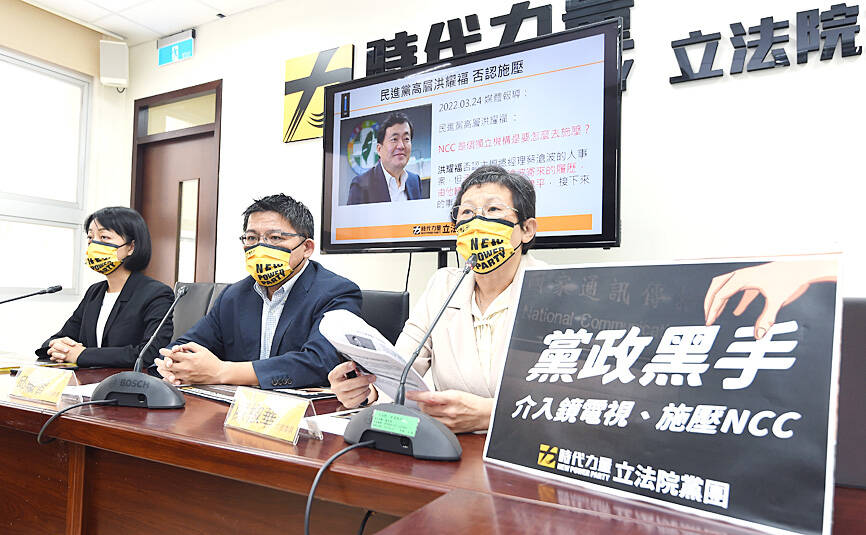The government intends to regulate online speech by introducing a draft digital intermediary services act, the New Power Party (NPP) caucus told a news conference in Taipei yesterday.
Although issues of Internet governance are nothing new, the question is how such laws should be designed and enforced to curb cybercrime and other problems while preventing the government censoring online speech in the name of fighting disinformation and crime, NPP caucus whip Chiu Hsien-chih (邱顯智) said.
If laws related to Internet governance are not stipulated carefully, freedom to criticize the government would be lost, which could be the death knell for freedom and democracy, Chiu said.

Photo: Liang Cheng-hui, Taipei Times
In 2013, before she became president, Tsai Ing-wen (蔡英文), the Democratic Progressive Party’s chairperson, opposed the then-Chinese Nationalist Party (KMT) government’s proposed amendment to Article 9 of the now-defunct telecommunications act, declaring that “diverse and innovative online platforms would lose their power to enliven society if administrative authorities use unclear laws to restrict people’s activities on the Internet,” he said.
“Has President Tsai forgotten what she said in 2013? Has she changed her mind since she took on the top job?” Chiu asked.
Based on the draft digital act, online platform operators must place an alert next to a message if administrative agencies consider it to be unsubstantiated or illegal, Chiu said.
If a court agrees that an information restraining order should be issued, it must do so within 48 hours of receiving a request from a government agency, Chiu said, adding that the rules would allow administrative agencies to arbitrarily restrict online activity.
The National Communications Commission (NCC) told the public that it had consulted similar regulations in the EU and UK when drafting the bill, but the EU’s Digital Services Act requires platform operators to enhance users’ ability to discern the credibility and quality of information they consume, rather than putting alerts next to content at the request of government agencies, Chiu said.
The UK’s draft online safety bill does not require courts to rule within 48 hours whether online content should be taken down, he said, adding that the conditions under which an information restraining order can be requested are clearer and stricter than the ones stipulated by the NCC.
The NCC should draft a feasible act that would not infringe on freedom of speech by adopting a bottom-up approach, while communicating with platform operators and civil groups, he said.
“Instead, the commission adopted a top-down approach, which generates concerns for impeding speech and is not consistent with legislation in other countries,” Chiu said. “People have reason to believe that the government is extending its tentacles into the Internet.”
NPP Legislator Claire Wang (王婉諭) said that the draft act would have little to no effect on platform operators if they do not have offices in Taiwan.
The NCC should not work behind closed doors, nor should it formulate unrealistic and unenforceable regulations, Wang said.

Trips for more than 100,000 international and domestic air travelers could be disrupted as China launches a military exercise around Taiwan today, Taiwan’s Civil Aviation Administration (CAA) said yesterday. The exercise could affect nearly 900 flights scheduled to enter the Taipei Flight Information Region (FIR) during the exercise window, it added. A notice issued by the Chinese Civil Aviation Administration showed there would be seven temporary zones around the Taiwan Strait which would be used for live-fire exercises, lasting from 8am to 6pm today. All aircraft are prohibited from entering during exercise, it says. Taipei FIR has 14 international air routes and

Taiwan lacks effective and cost-efficient armaments to intercept rockets, making the planned “T-Dome” interception system necessary, two experts said on Tuesday. The concerns were raised after China’s military fired two waves of rockets during live-fire drills around Taiwan on Tuesday, part of two-day exercises code-named “Justice Mission 2025.” The first wave involved 17 rockets launched at 9am from Pingtan in China’s Fujian Province, according to Lieutenant General Hsieh Jih-sheng (謝日升) of the Office of the Deputy Chief of the General Staff for Intelligence at the Ministry of National Defense. Those rockets landed 70 nautical miles (129.6km) northeast of Keelung without flying over Taiwan,

The Ministry of National Defense (MND) today released images of the military tracking China’s People's Liberation Army (PLA) movements during the latest round of Chinese drills around Taiwan. The PLA began "Justice Mission 2025" drills today, carrying out live-fire drills, simulated strikes on land and maritime targets, and exercises to blockade the nation's main ports. The exercises are to continue tomorrow, with the PLA announcing sea and air space restrictions for five zones around Taiwan for 10 hours starting from 8:30am. The ministry today released images showing a Chinese J-16 fighter jet tracked by a F-16V Block 20 jet and the

City buses in Taipei and New Taipei City, as well as the Taipei MRT, would on Saturday begin accepting QR code payments from five electronic payment providers, the Taipei Department of Transportation said yesterday. The new option would allow passengers to use the “transportation QR code” feature from EasyWallet, iPass Money, iCash Pay, Jkopay or PXPay Plus. Passengers should open their preferred electronic payment app, select the “transportation code” — not the regular payment code — unlock it, and scan the code at ticket readers or gates, General Planning Division Director-General Liu Kuo-chu (劉國著) said. People should move through the